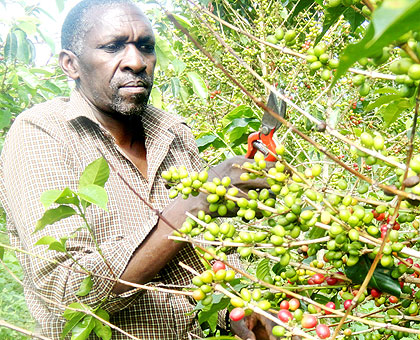The Government will continue facilitating the growth of exports by providing necessary infrastructure and incentives to help fill the country’s exports gap, Minister Francois Kanimba has said.


The Government will continue facilitating the growth of exports by providing necessary infrastructure and incentives to help fill the country’s exports gap, Minister Francois Kanimba has said.
The pledge by the Trade and Industry minister follows reports that despite increase in both value and volume of exports last year, traders failed to perform to government’s expectations, owing to persistent internal and external challenges that affected key sectors like agriculture and mining.
In general, exports seemed to perform well compared to the previous year, fetching revenues worth $489 million by November, up from $429 million in 2012.
Much as this represents "good performance,” according to a top official, it depicts a slow overall exports growth of 19 per cent, which is 9 per cent below what government expected last year.
Among others, the dire situation of exports led to the cancellation of cargo services by two foreign airlines last year–Turkish Airlines and Emirates–reasoning that the export volumes were too low for them to maintain operations in Rwanda.
"It is true that Rwanda faced some unfavorable conditions, especially in the first quarter of last year. For example, coffee and tea were affected by a long dry spell that interrupted farmers’ activities,” Minister Kanimba said.
"But we still believe that we can achieve the 28 per cent growth in exports this year. Looking at trends, global prices of tea and coffee will increase, whereas those of tin are already picking up.”
Insecurity in DR Congo
The minister said the crisis in eastern DR Congo meant that food crop exports to the region also drastically fell, yet several local companies depend on DR Congo for business.
"The insecurity in eastern DR Congo slowed down the growth of exports from the informal export. But we are optimistic that once peace is restored, business will go on as usual,” Kanimba said.
He said the volume of exports will rise again because local and international trends are positive.
Each sector has specific challenges, but the message from most exporters is that they believe that the best way to move forward is if government and the private sector worked more closely.
Faustin Nibiyizi, an exporter working as technical advisor at Dallas Investments, a coffee exporting company that buys produce from farmers in Nyamasheke, Gatsibo, Gicumbi districts, believes that despite subsidised fertilisers and pesticides, farmers still use rudimentary methods that yield low quality produce.
"There are some things that you simply cannot change, such as unexpected weather patterns that interfere with planting seasons. The challenge, however, is that many farmers are not willing to adjust. They stick to crude methods, fail to plant in time and refuse to use fertilisers and pesticides, and, in the end, the quality of their produce dwindles,” Niyibizi said.
This is a barrier that has affected the targets of several coffee companies, added Niyibizi, whose company exported only half of what it had planned to last year.
"We only managed 19.2 tonnes of ‘special’ coffee and 19.2 tonnes of ordinary coffee, which is only half of what we had targeted. We intend to export more specialty coffee because it fetches a good price; so we have gone closer to the farmers to try and address their challenges,” he said.
Tea farmers also experienced bad weather, but it is the low international price for the green leaf that frustrated them most.
"The severe dry spell in June and September affected our crop badly and our exports dropped by 37 per cent. In terms of values, prices at the Mombasa market fell drastically,” Sanjay Kumar, the director of Rwanda Tea Investment, said.
Harsh year for mineral sector
Mineral exporters, on top of price fluctuations, lost many European markets due to the negative perception on minerals from the region.
"The Europeans and Americans prefer to buy from Australia and Canada because they believe that minerals from any place near DR Congo are not ‘clean,’” Augustine Ruhigira, the executive secretary of Fecomirwa, a mining cooperative, said.
"Also, last year, the prices for tin and coltan dropped by almost 50 per cent and this discouraged many of us.”
He is, however, optimistic investment in the mining sector is set to grow because "banks are beginning to open up to the idea of investing in the sector.”
The National Agricultural Exportation Board (NAEB) is aware of the challenge and is working hard to ensure that it works with the players in order to meet the country’s targets, officials say.
"Quality produce is what the country aims for. We continue to sensitise the farmers to adhere to practices like mulching, pruning and utilising the fertilisers which are heavily subsidised by government,” Ndambe Nzaramba, the deputy director-general in charge of marketing and export at NAEB, said.
According to the five-year National Export Strategy of 2011, the priority sectors in the short and medium term are tea, coffee, tourism and mining, as well as non-traditional export sectors of horticulture and business process outsourcing.


